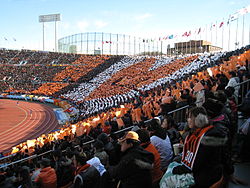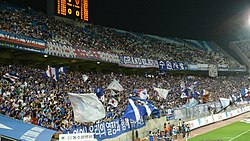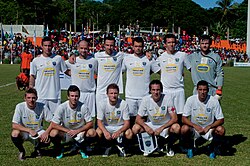List of FIFA Club World Cup participants
 From Wikipedia - Reading time: 16 min
From Wikipedia - Reading time: 16 min
The FIFA Club World Cup is an international association football competition organised by the FIFA, the sport's global governing body.[1] The championship was first contested as the FIFA Club World Championship in 2000.[2] It was not held between 2001 and 2004 due to a combination of factors, most importantly the collapse of FIFA's marketing partner International Sport and Leisure.[3] Following a change in format which saw the FIFA Club World Championship absorb the Intercontinental Cup, it was relaunched in 2005 and took its current name the season afterwards.[4]
The current format, in use since the competition was revamped ahead of the 2025 edition, features 32 teams competing for the title at venues within the host nation; 12 teams from Europe, 6 from South America, 4 from Asia, 4 from Africa, 4 from North, Central America and Caribbean, 1 from Oceania, and 1 team from the host nation. The teams are drawn into eight groups of four, with each team playing three Group stage matches in a round-robin format. The top two teams from each group advance to the knockout stage, starting with the round of 16 and culminating with the final.[1]
Debut of club teams
[edit]Each successive FIFA Club World Cup has had at least one club team appearing for the first time.
Notes
Confederation records
[edit]| Year | Club | Method of qualification | Performance | Ref(s) |
|---|---|---|---|---|
| 2000 | Winners of the 1998 Copa Libertadores | Runners-up | [5][30] | |
| Winners of the 1999 Campeonato Brasileiro Série A | Champions | [5][31] | ||
| 2005 | Winners of the 2005 Copa Libertadores | Champions | [32][33] | |
| 2006 | Winners of the 2006 Copa Libertadores | Champions | [7][34] | |
| 2007 | Winners of the 2007 Copa Libertadores | Runners-up | [10][35] | |
| 2008 | Winners of the 2008 Copa Libertadores | Runners-up | [12][36] | |
| 2009 | Winners of the 2009 Copa Libertadores | Runners-up | [15][37] | |
| 2010 | Winners of the 2010 Copa Libertadores | Third place | [16][34] | |
| 2011 | Winners of the 2011 Copa Libertadores | Runners-up | [25][38] | |
| 2012 | Winners of the 2012 Copa Libertadores | Champions | [31] | |
| 2013 | Winners of the 2013 Copa Libertadores | Third place | ||
| 2014 | Winners of the 2014 Copa Libertadores | Runners-up | ||
| 2015 | Winners of the 2015 Copa Libertadores | Runners-up | ||
| 2016 | Winners of the 2016 Copa Libertadores | Third place | ||
| 2017 | Winners of the 2017 Copa Libertadores | Runners-up | ||
| 2018 | Winners of the 2018 Copa Libertadores | Third place | ||
| 2019 | Winners of the 2019 Copa Libertadores | Runners-up | ||
| 2020 | Winners of the 2020 Copa Libertadores | Fourth place | ||
| 2021 | Winners of the 2021 Copa Libertadores | Runners-up | ||
| 2022 | Winners of the 2022 Copa Libertadores | Third place | ||
| 2023 | Winners of the 2023 Copa Libertadores | Runners-up | ||
| 2025 | Winners of the 2021 Copa Libertadores | TBD | ||
| Winners of the 2022 Copa Libertadores | TBD | |||
| Winners of the 2023 Copa Libertadores | TBD | |||
| Winners of the 2024 Copa Libertadores | TBD | |||
| CONMEBOL 4-year ranking | TBD | |||
| CONMEBOL 4-year ranking | TBD |
List of participating clubs of the FIFA Club World Cup
[edit]The following is a list of clubs that have played in or qualified for the FIFA Club World Cup. Editions in bold indicate competitions won. Rows can be adjusted to national league, total number of participations by national league or club and years played. Auckland City have contested the FIFA Club World Cup twelve times, more than any other club.
Notes
[edit]References
[edit]- ^ a b "FIFA Club World Cup Japan 2012 – Regulations" (PDF). Fédération Internationale de Football Association. Archived from the original (PDF) on 28 March 2013. Retrieved 11 March 2013.
- ^ "Brazil 2000 Final Draw". Fédération Internationale de Football Association. 14 October 1999. Archived from the original on 9 November 2013. Retrieved 6 March 2013.
- ^ "FIFA decides to postpone 2001 Club World Championship to 2003". Fédération Internationale de Football Association. 18 May 2001. Archived from the original on 9 November 2013. Retrieved 6 March 2013.
- ^ "Toyota confirmed as FIFA Club World Championship 2005 naming partner". Fédération Internationale de Football Association. 15 March 2005. Archived from the original on 9 November 2013. Retrieved 6 March 2013.
- ^ a b c d e "Corinthians - Vasco da Gama". Fédération Internationale de Football Association. 14 January 2000. Retrieved 4 March 2013.
- ^ a b "Deportivo Saprissa claim bronze". Fédération Internationale de Football Association. 18 December 2005. Archived from the original on 21 July 2013. Retrieved 4 March 2013.
- ^ a b c d "Internacional make it big in Japan". Fédération Internationale de Football Association. 17 December 2006. Archived from the original on 22 July 2013. Retrieved 4 March 2013.
- ^ a b "Shootout sends bronze to Urawa". Fédération Internationale de Football Association. 16 December 2007. Archived from the original on 21 July 2013. Retrieved 4 March 2013.
- ^ "Urawa Red Diamonds". Fédération Internationale de Football Association. Archived from the original on 19 September 2009. Retrieved 4 March 2013.
- ^ a b c d e "Dominant Milan rule the world". Fédération Internationale de Football Association. 16 December 2007. Retrieved 4 March 2013.
- ^ a b "Slender win gives Gamba third". Fédération Internationale de Football Association. 21 December 2008. Archived from the original on 30 December 2012. Retrieved 4 March 2013.
- ^ a b c d "Red Devils rule in Japan". Fédération Internationale de Football Association. 21 December 2008. Retrieved 4 March 2013.
- ^ a b "Steelers edge shootout for bronze". Fédération Internationale de Football Association. 19 December 2009. Archived from the original on 15 December 2012. Retrieved 4 March 2013.
- ^ "Pohang Steelers". Fédération Internationale de Football Association. Archived from the original on 7 February 2013. Retrieved 4 March 2013.
- ^ a b c d e "Club Estudiantes de La Plata vs FC Barcelona". Fédération Internationale de Football Association. 19 December 2009. Retrieved 4 March 2013.
- ^ a b "Internacional down ten-man Seongnam". Fédération Internationale de Football Association. 18 December 2010. Archived from the original on 1 April 2013. Retrieved 4 March 2013.
- ^ "Seongnam Ilhwa Chunma". Fédération Internationale de Football Association. 18 December 2010. Archived from the original on 2 April 2013. Retrieved 4 March 2013.
- ^ a b c d e f g "Internazionale on top of the world". Fédération Internationale de Football Association. 18 December 2010. Retrieved 4 March 2013.
- ^ a b "Al-Sadd take third on penalties". Fédération Internationale de Football Association. 18 December 2011. Archived from the original on 1 April 2013. Retrieved 4 March 2013.
- ^ "Al Sadd". Fédération Internationale de Football Association. Archived from the original on 27 December 2010. Retrieved 4 March 2013.
- ^ a b c d "Al-Ahly SC". Fédération Internationale de Football Association. Archived from the original on 30 May 2009. Retrieved 4 March 2013.
- ^ a b "Aboutrika the star as Al Ahly grab third". Fédération Internationale de Football Association. 17 December 2006. Archived from the original on 22 July 2013. Retrieved 4 March 2013.
- ^ "ES du Sahel". Fédération Internationale de Football Association. Archived from the original on 14 March 2013. Retrieved 4 March 2013.
- ^ "Tout Puissant Mazembe Englebert". Fédération Internationale de Football Association. Archived from the original on 3 January 2011. Retrieved 4 March 2013.
- ^ a b c d "Santos humbled by brilliant Barcelona". Fédération Internationale de Football Association. 18 December 2011. Retrieved 4 March 2013.
- ^ a b "Real Madrid - Necaxa". Fédération Internationale de Football Association. 14 January 2000. Retrieved 4 March 2013.
- ^ "Saprissa". Fédération Internationale de Football Association. Archived from the original on 6 March 2013. Retrieved 4 March 2013.
- ^ "América". Fédération Internationale de Football Association. Archived from the original on 31 October 2011. Retrieved 4 March 2013.
- ^ "Pachuca". Fédération Internationale de Football Association. Archived from the original on 14 June 2009. Retrieved 4 March 2013.
- ^ "Clube de Regatas Vasco da Gama". Fédération Internationale de Football Association. Archived from the original on 11 June 2009. Retrieved 4 March 2013.
- ^ a b "Corinthians". Fédération Internationale de Football Association. Archived from the original on 12 March 2013. Retrieved 4 March 2013.
- ^ a b c "Sao Paulo FC – Liverpool FC". Fédération Internationale de Football Association. 18 December 2005. Retrieved 4 March 2013.
- ^ "São Paulo". Fédération Internationale de Football Association. Archived from the original on 2 April 2013. Retrieved 4 March 2013.
- ^ a b "Internacional". Fédération Internationale de Football Association. Archived from the original on 6 March 2013. Retrieved 4 March 2013.
- ^ "Boca Juniors". Fédération Internationale de Football Association. Archived from the original on 20 February 2008. Retrieved 4 March 2013.
- ^ "Liga Deportiva Universitaria de Quito". Fédération Internationale de Football Association. Archived from the original on 12 August 2009. Retrieved 4 March 2013.
- ^ "Estudiantes (La Plata)". Fédération Internationale de Football Association. Archived from the original on 31 March 2013. Retrieved 4 March 2013.
- ^ "Santos". Fédération Internationale de Football Association. Archived from the original on 19 October 2008. Retrieved 4 March 2013.
- ^ "Auckland City FC withdraw from FIFA Club World Cup". FIFA.com. 15 January 2021. Retrieved 15 January 2021.
- ^ a b "Manchester United". Fédération Internationale de Football Association. Archived from the original on 20 February 2008. Retrieved 4 March 2013.
- ^ "Real Madrid". Fédération Internationale de Football Association. Archived from the original on 5 March 2013. Retrieved 4 March 2013.
- ^ "Liverpool". Fédération Internationale de Football Association. Archived from the original on 14 June 2009. Retrieved 4 March 2013.
- ^ a b c "FC Barcelona". Fédération Internationale de Football Association. Archived from the original on 5 March 2013. Retrieved 4 March 2013.
- ^ "AC Milan". Fédération Internationale de Football Association. Archived from the original on 20 February 2008. Retrieved 4 March 2013.
- ^ "Internazionale". Fédération Internationale de Football Association. Archived from the original on 5 March 2013. Retrieved 4 March 2013.
- ^ de Arruda, Marcelo Leme (10 January 2013). "FIFA Club World Championship". Rec.Sport.Soccer Statistics Foundation. Retrieved 6 March 2013.
External links
[edit]- FIFA's official site for the FIFA Club World Cup (in English, French, German, Portuguese, and Spanish)
- Toyota's official site for the FIFA Club World Cup (in English and Japanese)
 KSF
KSF










